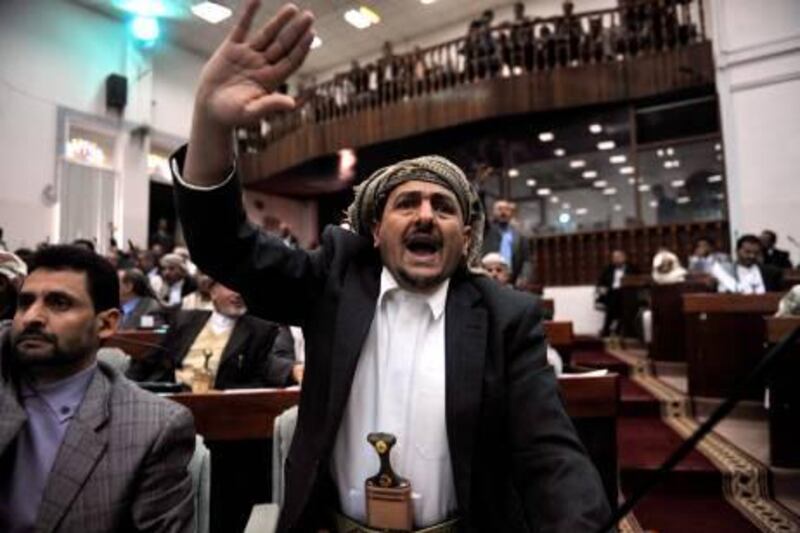SANAA // President Ali Abdullah Saleh will leave Yemen within the next few days after Yemen's parliament yesterday approved a law giving him immunity from prosecution as part of a deal that requires that he resign.
Mohammed Al Shayef, a ruling party official, said Mr Saleh is leaving soon for Oman, en route to medical treatment in the United States. It's unclear whether Mr Saleh will remain in exile.
Sultan Al Barakani, assistant secretary general of Mr Saleh's General People's Congress, said Mr Saleh is expected to visit Oman, Ethiopia and the US but would be in Yemen for the presidential election February 21.
An official in the prime minister's office, however, said Mr Saleh is "supposed to go back to Oman" after getting treatment in the US. He said Mr Saleh's son, Ahmed, is in Oman arranging a residence for his father.
Washington has been trying to get Mr Saleh out of Yemen - though not to settle in the US - to allow for a peaceful transition from his rule under a Gulf-brokered plan.
The new version of the law, approved by the unity government Cabinet on Thursday grants "complete immunity" to Mr Saleh. The legislation was revised to reduce the scope of amnesty to his aides, many of whom have worked with him during his 33-year rule, to "politically motivated" crimes. Under the revised law, they could eventually be held accountable for terrorist acts.
The new version was presented yesterday by Prime Minister Mohammed Salem Basindwah who wept as he urged the MPs to approve the deal so Yemen can begin to restore some kind of stable government.
"I know this law is going to cause me some problems, but I am ready to sacrifice my life for my country," Mr Basindwah told the parliament.
After parliament passed the law, hundreds of women marched in Taiz, protesting the law and demanding that Mr Saleh and his aides stand trial. Also, protest movement organisers have called for massive demonstrations today to demand that Mr Saleh and his aides face prosecution.
The original version of the legislation, which the cabinet approved on January 8, would have provided amnesty for all charges against Mr Saleh and aides "who worked with him in all government, civil and military departments during the years of his reign."
But citizens and human rights groups complained about the scope of the immunity and it was reduced somewhat.
Yemen's vice president, opposition parties and members of Mr Saleh's party - under the supervision of the UN envoy to Yemen Jamal Benomar - agreed to the changes on Wednesday
The final version states that Mr Saleh's aides cannot face prosecution for "actions that were politically motivated and carried out in the exercise of their duties". But it specifies that the amnesty does not apply to acts of terrorism, as defined by international conventions, said Mohammed Al Mikhlafi, minister of legal affairs in an interview yesterday.
The parliament also approved the nomination of Abdurabu Mansur Hadi, the vice president and the interim leader, as a candidate in the presidential election. Under provisions of the peace deal, Mr Hadi would be elected to run the country for a two-year transitional period, during which a new constitution would be drafted.
Mr Saleh's return to Yemen, even if he no longer holds the post of president, could mean continued turmoil for the country. Despite the creation of a unity government between his party and the opposition, Mr Saleh - still formally the president - has continued to influence politics from behind the scenes through his family and loyalists in powerful positions. The US does not want to take him in, concerned it would be seen by Yemenis as harbouring someone they say is responsible for the deaths of hundreds of protesters, according to a report from The Associated Press. Saudi Arabia and the United Arab Emirates already have rejected Mr Saleh, American officials said.
The government's approval of the legislation comes a day after hundreds of thousands of people protested in about 17 provinces, demanding the prosecution of Mr Saleh and his aides for the killing of the protesters.
"This law is a crime by itself and a betrayal to the blood of the martyrs. It is also coming from an outgoing parliament and a government which have no legitimacy," said Wafa Al Shaibani, a sister of one of the victims.
"We will continue to protest till we get justice. We will seek the international justice if we fail here. We cannot accept immunity to criminals and killers," Ms Al Shaibani said.
* With files from Agence France-Presse and Associated Press






